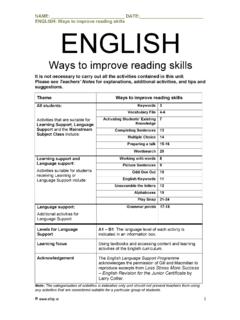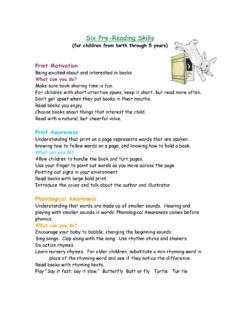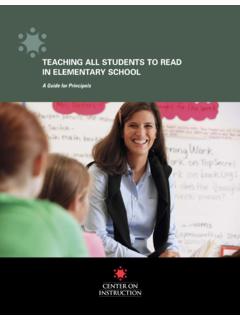Transcription of EXAMPLE Reading Skills, Strategies & Levels of Thinking in ...
1 2013 Scientific Learning Corporation. All rights reserved. EXAMPLE Reading skills , Strategies & Levels of Thinking in Reading Assistant The Think About It and comprehension quiz questions in Reading Assistant lead students to use Reading Strategies that skilled readers use. Read below for examples of the skills , Strategies and Levels of Thinking practiced in Reading Assistant. Strategies STRATEGY DEFINITION EXAMPLES Use prior Knowledge (K-12) Students bring to mind what they know about a topic as a basis for building can be a factual or personal experience.
2 Question Have you ever seen a duck? What do ducks do? More than one answer can be correct. (Swim / Quack / Fly) Predict (K-12) Predict upcoming events or information based on what is known from the text so far. Question Finch has gotten Crow to agree to many things. What might happen in the next part? (Finch and Crow will be friends. / Crow will get angry. / Finch will agree to live next door.) Make connections (self / world) (K-12) Text-to-self connections: similar to prior knowledge; student thinks about how text information relates to personal experience Prompt Kate has to decide to cross the bridge in the storm or go home for help.
3 Think about what you would do if you were Kate. Text-to-world connections: similar to prior knowledge; student uses common sense or background knowledge to make sense of text; part of the information needed to answer the question is not in the text at all and must be supplied by the reader Question The article says that 3% of Earth s water is fresh water. Is this a lot? (yes / no) What else might have caused the loud cracking sound? (falling tree branches / gunfire / something heavy falling onto the rock slab) Visualize (K-12) Create mental images from text; often involves synthesizing information and making some inferences Question Imagine the scene in the palace.
4 Which of the following might be there? (broken chairs / golden vases / barking dogs) 2013 Scientific Learning Corporation. All rights reserved. Comprehension skills Good readers use comprehension skills automatically as they read to understand and learn from text. In Reading Assistant, quiz questions focus on comprehension skills and assess student understanding of a selection. SKILL DEFINITION EXAMPLE Inferences Generate information that is not explicitly stated in the text.
5 The reader must provide information from prior knowledge or connect information in the text that is not explicitly connected. For EXAMPLE , in the sentence Dark clouds rolled in, and Manny strained to see, inferences that can be made include that it is daytime, the clouds were dark enough to make it hard to see, there may be a storm coming, or that Manny is looking for something. Do you think that these penguin parents take good care of the eggs? (yes / no) Why do you think Manny strained to see? (It is nighttime.)
6 / The clouds made it very dark outside. / The wind blew something into his eye. / Clouds were rolling in the sky.) Sequence Understand the order of events in a narrative or steps in a process. Before she went to school, Min taught herself to read. Which did Min do first? (go to school / learn to read) Theme (fiction) Generalize to identify the moral, theme, or lesson of a story. What lesson can you learn from this tale? (think before you act / trust your first impression / follow the EXAMPLE of others in the group) Figurative language Interpret idioms, metaphors or similes, or other figurative language that would be confusing if taken literally.
7 When Dad said, Keep your eyes on the road, he meant for Ted to pay attention to his driving. (True / false) What is a world class school? Compare and contrast Identify likenesses and differences between objects or events presented within a text. How do the new high school schedules differ from traditional schedules? More than one answer may be correct. (School starts later in the day / class periods are longer / school is open for 11 months / there are no study halls) 2013 Scientific Learning Corporation.
8 All rights reserved. Author's point of view (6-12 only) Identify author s point of view, likely opinion about a character or topic, bias, and offer support from statements in the text. What does the author think about Columbus Day? (should not be a national holiday / should be a holiday in communities that want it / should be a national holiday / should become a day to honor all explorers of North America) Fact and opinion; evaluate support (4-12 only) Identify statements as facts or opinions; evaluate evidence provided for statements of opinion.
9 The author says that dogs are unhappy as pets. What kind of statement is this? (fact / opinion) How does Talia support her opinion that schools should stay open all year? More than one answer may be correct. (more students could attend one school / working families would need less childcare / energy costs would be less) Diagrams, Charts, Graphs Extracting and/or interpreting information from visuals. According to the timeline, were there people in the region before the Grand Canyon started to form? Cause and effect Recognizing or inferring a causal relationship between stated events in a text.
10 Recognizing or inferring a causal chain of events. Cause and effect is literal when the link is stated explicitly with words and phrases like because, as a result, so, etc. It is inferential when there is no linking word in the text. Why did the high school change the starting time? What other kinds of damage might the storm have done? Main idea (nonfiction) Identifying an overarching statement that covers several examples in the text; identifying detail statements in the text that support a stated main idea. What is the main idea of this section?









